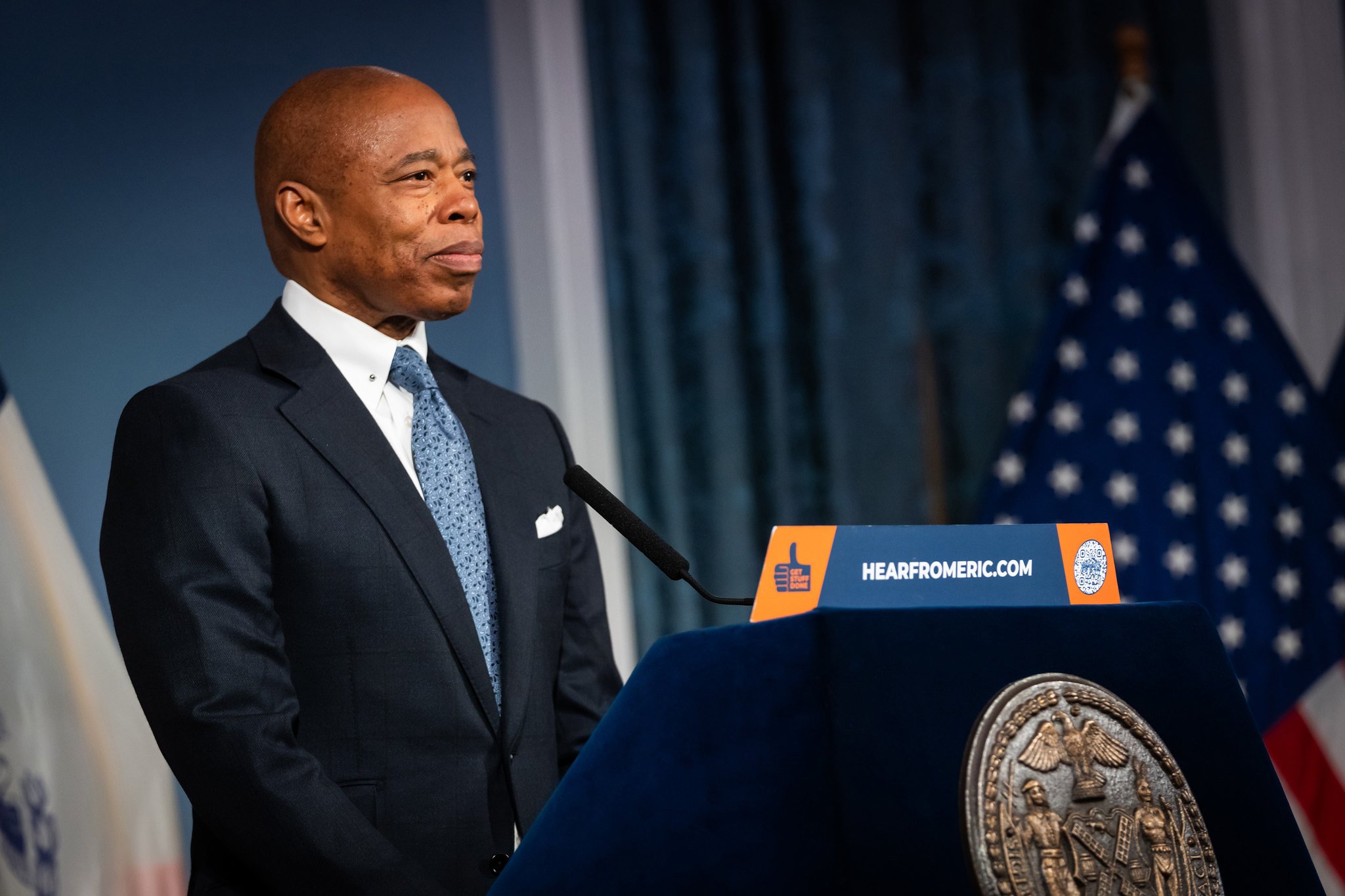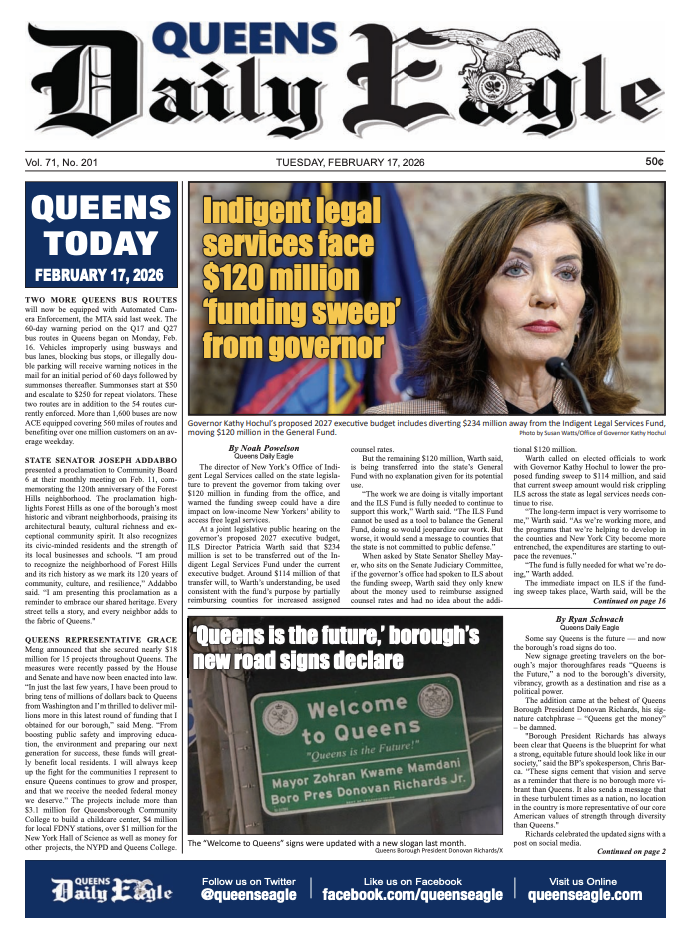While cuts remain, Adams provides sunny budget outlook
/Mayor Eric Adams unveiled his preliminary budget for Fiscal Year 2025, providing a sunnier outlook than was originally expected. Ed Reed/Mayoral Photography Office.
By Ryan Schwach
After months of providing a cloudy, less-optimistic view on the city’s financial situation, Mayor Eric Adams unveiled his preliminary budget on Tuesday with a more sunny outlook on the year ahead.
Just days after reversing budget cuts his administration initially put in place last year, and expressing worries the migrant crisis would lead to more cuts, the mayor said that appropriate fiscal management, higher than expected tax revenue and increased state funding have allowed the city to stave off some of its expected budget cuts.
Although the $109.4 billion city budget for Fiscal Year 2025 does include some cuts, the administration believes that any serious service disruptions, which were feared, were avoided.
“These accomplishments are the results of our administration's careful fiscal planning and steady management,” the mayor said. “We took steps like implementing a hiring freeze and a program to eliminate the gap or PEG savings program, setting us up to succeed. These actions along with an unexpectedly strong economy help balance Fiscal Year 25. Let's be clear, we balanced the budget without unduly burdening New Yorkers with tax hikes or massive service reductions and without laying off the single city worker.”
The Adams administration believes that the management of the migrant crisis, along with the stronger economy is enough to make up for what was a projected $7.1 billion budget gap for 2025.
The administration’s original fiscal outlook received widespread pushback from the City Council, which claimed the administration had overestimated the cost of the migrant crisis and was making unnecessary cuts to city services.
Reporters at a press conference following the budget presentation questioned the administration on why their projections from last year were inaccurate, an assertion the mayor’s budget director pushed back on.
“Our forecasts are in line with all the fiscal monitors,” said Budget Director Jaques Jiha. “We are a bit more optimistic than the council…their forecast is more conservative, that doesn't make ours out of line, because our forecast is more or less in line.”
While the mayor celebrated the reversal to some of the cuts made by his administration on Tuesday, a number of promises came with a caveat. Some of the promises to restore cuts will require money from the state, Adams claimed, including money allocated to the city by Governor Kathy Hochul, who unveiled her own preliminary budget earlier Tuesday.
“We still need to review the details of the governor's executive budget that was just released,” the mayor said. “If we receive sufficient funding from the state, we will be able to cancel the April PEG savings program and avoid the possibility of service reductions in the future.”
The mayor also did not stop his repeated calls for more funding from the federal government to aid in managing the migrant crisis.
“We're not out of the woods,” he said. “While we have stabilized our fiscal picture and put New York City on the right track to keep moving forward, we still need help from the federal and state governments.”
Also, ahead of the budget announcement, the mayor announced a new independent panel to advise the administration on budget negotiations.
Though the panel, which has been meeting regularly for the past six weeks to review the city’s current fiscal situation, did not have input in the budget proposed on Tuesday, it appears it will have influence over upcoming budget negotiations with the City Council.
A release from the mayor’s office said that the panel will share “relevant findings and recommendations” with City Hall and the public on the city’s budget. Though it isn’t entirely clear why the panel was created, Adams has been hit hard by political opponents over his management of the city’s finances, and a panel like the one announced on Tuesday could provide the mayor cover for unpopular financial decisions.
Among his biggest critics have been City Council Finance Committee Chair Justin Brannan and City Council Speaker Adrienne Adams, who weighed in on the mayor’s budget announcement with general positivity, but also didn’t pat Adams on the back and didn’t credit his administration with restoring the cuts that they themselves imposed on projections that turned out to be wrong.
“For months, [the City Council] has called on the administration to shift the delivery of certain services for people seeking asylum to mission-driven non-profit organizations that are invested in the long-term success of our communities,” said Speaker Adams. “We're glad the administration is listening.”
Comptroller Brad Lander also acknowledged the pros in the budget announcement, but insisted that more needs to be done.
“Even with additional state funding for asylum seekers, the city needs to do a far better job of managing costs, negotiating down per diem rates at hotels, and moving from emergency procurement to RFPs and bids that better address vendor integrity and price,” he said in a statement.
“I was pleased to see that the mayor increased funding to address some of the fiscal cliffs that my office has previously identified, and that City Hall is not proposing to tap into long-term reserves,” he added. “Other long-term budget issues, like the growing cost of uniformed overtime and claims against the city, remain unaddressed. While I was grateful to see key programs like Summer Rising and sanitation services restored, critical services, such as CUNY, still face painful cuts, and agency vacancies and attrition continue to jeopardize key city capacities.”
The mayor’s more consistent critics, like Public Advocate Jumanee Williams, ridiculed the administration for inaccurate projections which led to the initial cuts last year.
"Let's be clear: restoring key services in this budget is vital, though it does not undo the several previous rounds of cuts, or the damage done,” he said."This restoration isn’t the result of solid budgeting, but misleading math — single-handedly slashing services based on inaccurate projections, then reversing them. New Yorkers' trust in government erodes any time they are misinformed by government about policies and programs.”




